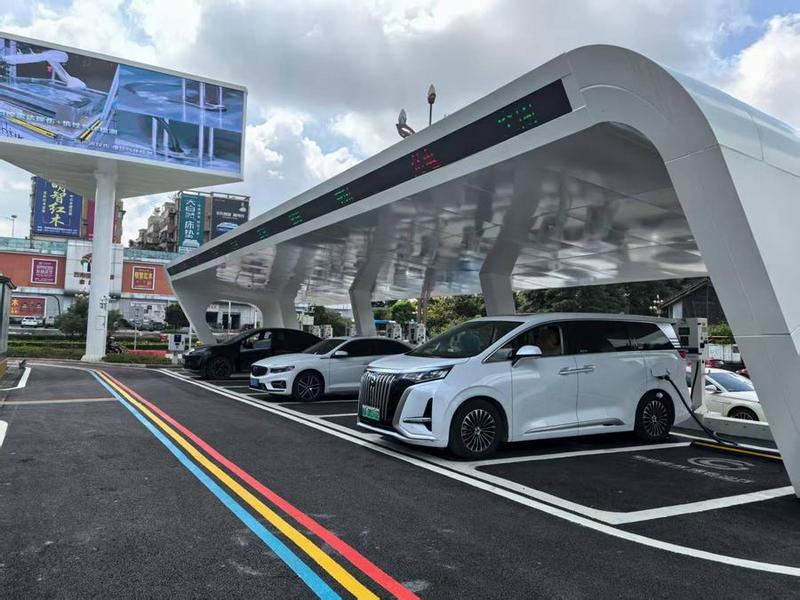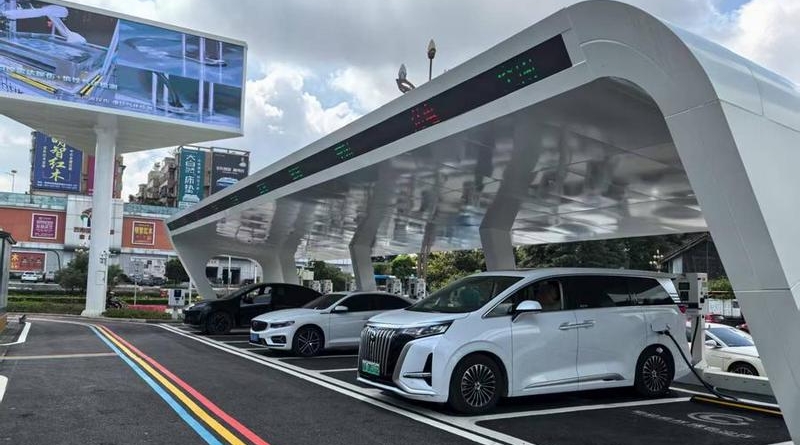
Electric vehicles are charged at the Quanhu Park station equipped with ultra-fast liquid-cooled chargers in Guiyang, Southwest China's Guizhou province, June 13, 2025. [Photo/Xinhua]
China's green efforts are reshaping the global future of mobility and energy, with electric vehicles and charging infrastructure leading the way, said industry experts.
"China is moving rapidly toward electrification, at a pace nine times faster than the global average," said Ma Jun, director of the Institute of Public and Environmental Affairs, a Beijing-based non-profit environmental organization.
Ma made the remarks at an event hosted by the Center for China and Globalization, a Beijing-based think tank.
Ma said that as the penetration rate of EVs in China now approaches 50 percent, the country is expanding its push beyond passenger cars to heavy-duty trucks, broader transport systems, and even industrial and lifestyle electrification.
"The country's low-carbon transition is advancing at a steady pace," he said.
According to data from the China Machinery Industry Federation, a notable milestone was reached in NEV market penetration in the first half of this year, hitting 44.3 percent, an all-time high for the period.
"More than half of the world's new energy vehicles are now on China's roads, reflecting how green mobility and clean energy consumption are becoming deeply rooted in everyday life," said Du Zhongming, head of the electricity bureau at the National Energy Administration.
NEA data show that during the 14th Five-Year Plan (2021-25), China built the world's largest EV charging network. As of the end of July, the country had 16.7 million charging points — equivalent to two chargers for every five EVs.
"In the collective effort to achieve carbon neutrality and zero emissions goals, China's EV industry is expected to make a major contribution," said Wang Yang, founder and CEO of charging service provider NaaS Technology, at the CCG event.
That is because Chinese expertise in EV technology, charging infrastructure and operational platforms is increasingly being shared worldwide, Wang added.
She also highlighted the role of digital technology in transforming energy systems. "The future of EV charging will be driven not by human choice but by algorithms. For example, artificial intelligence will help determine which stations have free capacity or which routes are most energy-efficient, reducing the burden on drivers," Wang said.
According to the executive, China's extensive deployment of new energy solutions is generating vast amounts of data, forming the foundation for AI-enabled innovation in the sector.
"I believe the country will not only remain at the forefront of the new energy industry but also lead globally in applying AI to the energy sector — from algorithms and computing power to large language models," Wang said, adding that as a major charging service platform, NaaS aims to connect upstream and downstream players in the charging ecosystem to boost overall industry efficiency.


 Share:
Share: 




 京公网安备 11010802027341号
京公网安备 11010802027341号